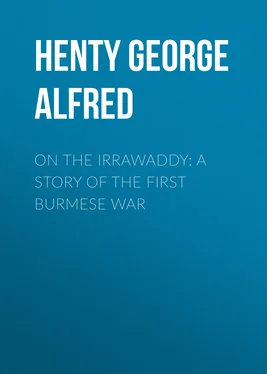George Henty - On the Irrawaddy - A Story of the First Burmese War
Здесь есть возможность читать онлайн «George Henty - On the Irrawaddy - A Story of the First Burmese War» — ознакомительный отрывок электронной книги совершенно бесплатно, а после прочтения отрывка купить полную версию. В некоторых случаях можно слушать аудио, скачать через торрент в формате fb2 и присутствует краткое содержание. Жанр: foreign_children, foreign_antique, foreign_prose, prose_military, на английском языке. Описание произведения, (предисловие) а так же отзывы посетителей доступны на портале библиотеки ЛибКат.
- Название:On the Irrawaddy: A Story of the First Burmese War
- Автор:
- Жанр:
- Год:неизвестен
- ISBN:нет данных
- Рейтинг книги:4 / 5. Голосов: 1
-
Избранное:Добавить в избранное
- Отзывы:
-
Ваша оценка:
- 80
- 1
- 2
- 3
- 4
- 5
On the Irrawaddy: A Story of the First Burmese War: краткое содержание, описание и аннотация
Предлагаем к чтению аннотацию, описание, краткое содержание или предисловие (зависит от того, что написал сам автор книги «On the Irrawaddy: A Story of the First Burmese War»). Если вы не нашли необходимую информацию о книге — напишите в комментариях, мы постараемся отыскать её.
On the Irrawaddy: A Story of the First Burmese War — читать онлайн ознакомительный отрывок
Ниже представлен текст книги, разбитый по страницам. Система сохранения места последней прочитанной страницы, позволяет с удобством читать онлайн бесплатно книгу «On the Irrawaddy: A Story of the First Burmese War», без необходимости каждый раз заново искать на чём Вы остановились. Поставьте закладку, и сможете в любой момент перейти на страницу, на которой закончили чтение.
Интервал:
Закладка:
This wanton insult was followed by a formal declaration of war, by the government of India; and a similar document was issued by the court of Ava. The force at Sylhet was reinforced, and that in Chittagong increased. It consisted of a wing of the 13th and of the 20th Native Regiments, and a battalion of the 23rd, with a local levy, amounting in all to some 3000 men. Of these a wing of the 23rd, with two guns, and a portion of the native levies were posted at Ramoo, which was the point most threatened by an invasion from Aracan.
It was in the north that hostilities first commenced, a force moving into Assam and driving the Burmese before them. Several sharp blows were dealt the enemy and, had it not been for the setting in of the wet season, they would have been driven entirely out of Assam.
"I think, Stanley," his uncle said, after he had been a short time at Chittagong, "you had better go up to Ramoo, and see about matters there. Of course, until the Burmese move we cannot say what their game is likely to be; but it will be as well to get the stores ready for embarkation, in case they should advance in that direction. If they do so, get everything on board at once; and you can then be guided by circumstances. As the dhow came in yesterday, I can spare both our boats; and shall, of course, ship the goods here on board the big craft. Even if the Burmese come this way, I have no fear of their taking the town; and shall, of course, lend a hand in the defence, if they attempt it. You can do the same at Ramoo, if you like.
"I was chatting with Colonel Shatland yesterday. He tells me that a large fleet has been collected, and that an expedition will be sent to capture Rangoon so, in that case, it is likely that Bandoola and his force will march off in that direction.
"I think government are wrong. It will be impossible for the troops to move, when the wet season once sets in; and they will lose a tremendous lot of men from sickness, if they are cooped up in Rangoon. They had very much better have sent a few thousand men down here, to act on the defensive and repel any attempted invasion, until the rains are over; when they could have been shipped again, and join the expedition against Rangoon. It seems to me a mad-headed thing, to begin at the present time of the year. We have put up with the insults of the Burmese for so long that we might just as well have waited for the favourable season, before we began our operations in earnest."
Accordingly, on the following day Stanley started south for Ramoo and, on arriving there, took charge of the trading operations. Shortly after, meeting Captain Noton–who commanded there–in the street, he recognized him as an officer who had been stationed at the same cantonment as his father; and whom he had, four years previously, known well.
"You don't recognize me, Captain Noton," he said. "I am the son of Captain Brooke, of the 33rd."
"I certainly did not recognize you," the officer said, "but I am glad to meet you again. Let me think; yes, your name is Stanley, and a regular young pickle you used to be. What on earth are you doing here? Of course, I heard of your poor father's death, and was grieved, indeed, at his loss. Where is your mother? She is well, I hope."
"She went back to England with my sisters, two months after my father's death. I joined my uncle, her brother. He is a trader, and carries on business in the district between here and Sylhet, trading principally on the rivers; but of course the war has put a stop to that, for the present. We saw the fighting up in the north, and then came down to this district. He has remained at Chittagong, and I am in charge of goods here. I speak Burmese fairly now and, if I can be of any use to you, I shall be very glad to be so. There is not much business here; and the Parsee clerk, who is generally in charge, can look after it very well. I acted as interpreter with the troops in the north, and have a letter from Mr. Scott, the commissioner, thanking me for my services."
"I remember you used to be able to talk four or five of the native languages, but how did you come to pick up Burmese?"
"From a servant of my uncle's. We thought that there would be sure to be war, sooner or later; and that, after it was over, there would be a good chance of profitable trade on the Burmese rivers. I had no great difficulty in learning it from my uncle's man, who was a native of Aracan."
"I have no doubt you will find it very useful. What a big fellow you have grown, Stanley; at least, as far as height is concerned. Let me see. How old are you, now?"
"I am past sixteen," Stanley replied. "I have had several touches of fever–caught, I suppose, from the damp on the rivers–but I think that I am pretty well acclimatized, now. I know I don't look very strong, but I have not had much active exercise and, of course, the climate is against me."
"Very much so. I wonder that you have kept your health as well as you have, in this steamy climate.
"I am going to the mess room, now. You had better come and lunch with me, and I will introduce you to the other officers. We are very strong in comparison to the force for, counting the assistant surgeon, there are ten of us."
"I shall be very glad, sir," Stanley said. "I have certainly been feeling rather lonely here; for I know no one, and there is very little to do. During the last year, I have often gone up one of the rivers by myself; but there has always been occupation while, at present, things are at a standstill."
"I tell you what, Brooke, if you would like it, I can appoint you interpreter. There is not one of us who speaks this Mug language–which is, you know, almost the same as Burmese–and the officers in charge of the native levy would be delighted to have some one with them who could make the fellows understand. I can appoint you a first-class interpreter. The pay is not very high, you know; but you might just as well be earning it as doing nothing, and it would give you a sort of official position and, as the son of a British officer, and my friend, you would be one of us."
"Thank you very much, Captain Noton. I should like it immensely. Should I have to get a uniform?"
"There will be no absolute necessity for it; but if you get a white patrol jacket, like this, and a white cap cover, it will establish you in the eyes of the natives as an officer, and give you more authority. Oh, by the way, you need not get them, for one of our lieutenants died, the other day, of fever. His effects have not been sold, yet; but you may as well have his patrol jackets and belts. We can settle what you are to pay for them, afterwards. It will only be a matter of a few rupees, anyhow."
They now arrived at the house that had been taken for the use of the officers. On entering, Captain Noton introduced him to the others and, as several of these had at various times met his father, in cantonments or on service, he was heartily welcomed by them and, at luncheon, they listened with great interest to his accounts of the fighting, in Cachar, with the Burmese.
"I fancy we shall find them more formidable, here, if they come," Captain Noton said. "Bandoola has a great reputation, and is immensely popular with them. From what you say, a considerable proportion of the fellows you met up there were Assamese levies, raised by the Burmese. I grant that the Burmese, themselves, do not seem to have done much better; but they would never have conquered all the peoples they have come across, and built up a great empire, if there had not been good fighting stuff in them. I have no doubt that we shall thrash them, but I don't think we shall do it as easily as our troops did in the north."
The time now passed pleasantly with Stanley. He had, after thinking it over, declined to accept payment for his services; for this would have hindered his freedom of action, and prevented his obeying any instructions that his uncle might send him. He therefore joined as a volunteer interpreter, and was made a member of the officers' mess. He was specially attached to the native levy and, soon acquiring their words of command, assisted its officers in drilling it into something like order.
Читать дальшеИнтервал:
Закладка:
Похожие книги на «On the Irrawaddy: A Story of the First Burmese War»
Представляем Вашему вниманию похожие книги на «On the Irrawaddy: A Story of the First Burmese War» списком для выбора. Мы отобрали схожую по названию и смыслу литературу в надежде предоставить читателям больше вариантов отыскать новые, интересные, ещё непрочитанные произведения.
Обсуждение, отзывы о книге «On the Irrawaddy: A Story of the First Burmese War» и просто собственные мнения читателей. Оставьте ваши комментарии, напишите, что Вы думаете о произведении, его смысле или главных героях. Укажите что конкретно понравилось, а что нет, и почему Вы так считаете.












